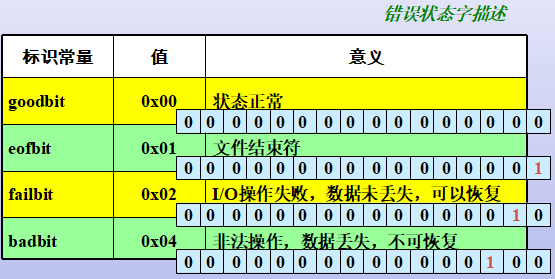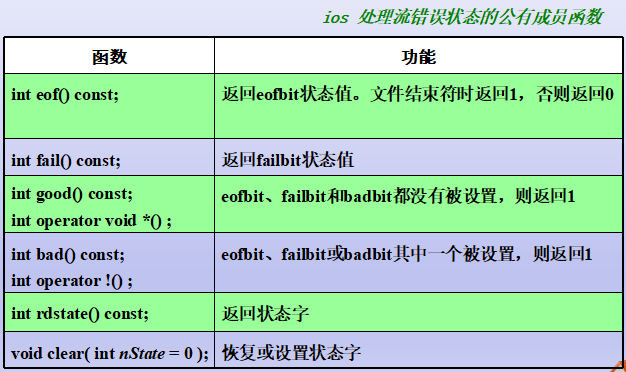一、输入流操作
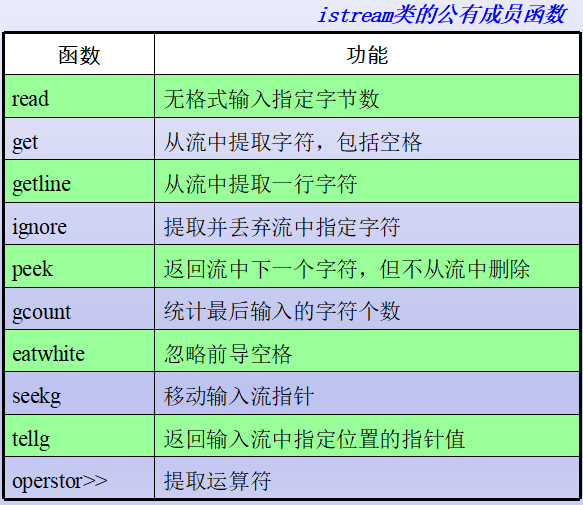
1.read 无格式输入指定字节数
istream& read ( char* pch, int nCount );
istream& read ( unsigned char* puch, int nCount );
istream& read ( signed char* psch, int nCount );
2.get 从流中提取字符,包括空格
int get();
istream& get( char* pch, int nCount, char delim = ' ' );
istream& get( unsigned char* puch, int nCount, char delim = ' ' );
istream& get( signed char* psch, int nCount, char delim = ' ' );
istream& get( char& rch ); istream& get( unsigned char& ruch );
istream& get( signed char& rsch );
istream& get( streambuf& rsb, char delim = ' ' );
3.getline 从流中提取一行字符
istream& getline( char* pch, int nCount, char delim = ' ' );
istream& getline( unsigned char* puch, int nCount, char delim = ' ' );
istream& getline( signed char* psch, int nCount, char delim = ' ' );
4.ignore 提取并丢弃流中指定字符
istream& ignore( int nCount = 1, int delim = EOF );
5.peek 返回流中下一个字符,但不从流中删除
int peek();
6.gcount 统计最后输入的字符个数
int gcount() const;
7.eatwhite 忽略前导空格
void eatwhite();
8.seekg 移动输入流指针
istream& seekg( streampos pos );
istream& seekg( streamoff off, ios::seek_dir dir );
9.tellg 返回输入流中指定位置的指针值
streanpos tellg();
10.operator >> 提取运算符
basic_istream& operator>>( basic_istream& (*pf)(basic_istream&));
basic_istream& operator>>( basic_ios<E, T>& (*pf)(basic_ios<E, T>&));
basic_istream& operator>>( ios_base<E, T>& (*pf)(ios_base<E, T>&));
basic_istream& operator>>( basic_streambuf<E, T> *sb);
basic_istream& operator>>(bool& n);
basic_istream& operator>>(short& n);
basic_istream& operator>>(unsigned short& n);
basic_istream& operator>>(int& n);
basic_istream& operator>>(unsigned int& n);
basic_istream& operator>>(long& n);
basic_istream& operator>>(unsigned long& n);
basic_istream& operator>>(void *& n);
basic_istream& operator>>(float& n);
basic_istream& operator>>(double& n);
basic_istream& operator>>(long double& n);
例子:
1 //用get函数从键盘输入字符 2 void f1(){ 3 char c; 4 cout<<"Enter first sentence followed by enter "; 5 while((c = cin.get())!=' ') 6 cout.put(c); 7 cout<<endl; 8 9 cout<<"Enter second sentence followed by enter "; 10 while(cin.get(c)){ 11 if (c == ' ') 12 break; 13 cout.put(c); 14 } 15 cout<<endl; 16 17 cout<<"Enter thired sentence followed by enter "; 18 char s[80]; 19 cin.get(s, 10); 20 cout<<s<<endl; 21 }
输出:
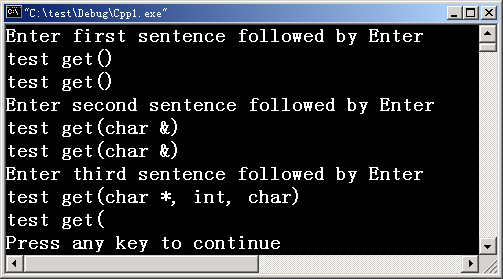
二、输出流
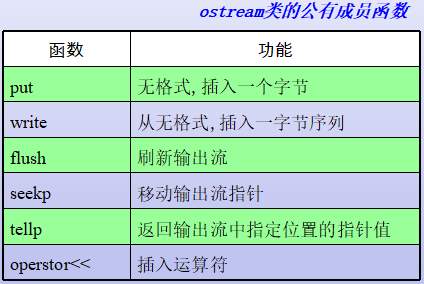
1.put 无格式,插入一个字节
ostream& put(char ch);
2.write 从无格式,插入一字节序列
ostream& write( const char* pch, int nCount );
ostream& write( const unsigned char* puch, int nCount );
ostream& write( const signed char* psch, int nCount );
3.flush 刷新输出流
ostream& flush();
4.seekp 移动输出流指针
ostream& seekp( streampos pos );
ostream& seekp( streamoff off, ios::seek_dir dir );
5.tellp 返回输出流中指定位置的指针
streampos tellp();
6.operstor<< 插入运算符
basic_ostream& operator<<( basic_ostream& (*pf)(basic_ostream&));
basic_ostream& operator<<( basic_ios<E, T>& (*pf)(basic_ios<E, T>&));
basic_ostream& operator<<( ios_base<E, T>& (*pf)(ios_base<E, T>&));
basic_ostream& operator<<( basic_streambuf<E, T> *sb);
basic_ostream& operator<<(const char *s);
basic_ostream& operator<<(char c);
basic_ostream& operator<<(bool n);
basic_ostream& operator<<(short n);
basic_ostream& operator<<(unsigned short n);
basic_ostream& operator<<(int n);
basic_ostream& operator<<(unsigned int n);
basic_ostream& operator<<(long n);
basic_ostream& operator<<(unsigned long n);
basic_ostream& operator<<(float n);
basic_ostream& operator<<(double n);
basic_ostream& operator<<(long double n);
basic_ostream& operator<<(void *n);
例子:
1 #include<iostream.h> 2 void main() 3 { cout << "Enter a sentence followed by Enter " ; 4 char s[ 26 ] ; 5 cin.getline ( s, 26 ) ; 6 cout.write(s, 26) ; 7 cout<<endl; 8 }
输出:
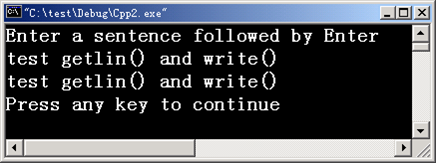
三、流错误状态
